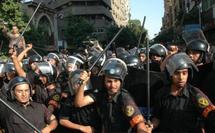
They were accused of "unlawful arrest" and "excessive use of force" against 28-year-old Khaled Said, whose death sparked nationwide protests and criticism abroad. The two did not enter a plea.
According to witnesses to the incident, Said was approached by the two plainclothes policemen in an Internet cafe on June 6 demanding to search him. When he refused, they dragged him out and beat him to death.
Two autopsies ordered by Egypt's state prosecutor concluded that Said had died of asphyxiation after swallowing a bag of marijuana when he saw the police officers approaching.
Rights groups have rejected the official account, and Said has since become a symbol for rights activists against police brutality, for which Egypt has been widely criticised.
Lawyers for his family on Tuesday asked that the charges against the two policemen be stiffened to murder, but said they will make a formal request at a later date.
The hearing was adjourned until September 25, until which time the policemen are to remain in custody.
Around 30 protesters stood outside the court demanding an end to police brutality and torture. After the trial, minor scuffles broke out with police who tried to disperse the demonstrators.
Ahead of the hearing, Said's sister Zahra, dressed in black, told reporters that "Khaled will get his rights," while family members of the two policemen insisted both had a good reputation and were only following orders.
Graphic pictures of a bruised and battered Said have appeared on social networking websites, triggering the public outcry and condemnation from local and international rights groups.
On the eve of the trial, London-based rights watchdog Amnesty International urged Egyptian authorities to ensure protection for witnesses in the case and end a legacy of impunity for police.
"The referral for trial of the two police officers accused of assaulting (Khaled Said) shortly before his death is a welcome first step towards breaking the cycle of impunity that has for so long facilitated torture and abuse of suspects by police in Egypt," said Amnesty's Malcolm Smart in a statement.
"The Egyptian authorities must ensure that the witnesses to the beating as well as the dead man's family and those working to bring out the truth are protected from threats, violence and intimidation, and feel able to freely testify in court," he said.
Amnesty, quoting lawyers, said witnesses feared to come forward after one of Said's friends, Tamer al-Sayyed Abdelmoneim, was attacked on July 20 by nine people brandishing knives who warned him to keep out of the case.
"It is vital that in cases of this nature, where police officers are alleged to have used violence against suspects in their custody, that the Egyptian authorities take all possible steps to ensure justice," Smart said.
"For far too long, some police officers and security officials in Egypt have acted as if they believe themselves to be above the law, which has bred a culture of injustice and impunity. It is high time that this was brought to an end, once and for all," he said.
------------------------------------------------------------------------------
According to witnesses to the incident, Said was approached by the two plainclothes policemen in an Internet cafe on June 6 demanding to search him. When he refused, they dragged him out and beat him to death.
Two autopsies ordered by Egypt's state prosecutor concluded that Said had died of asphyxiation after swallowing a bag of marijuana when he saw the police officers approaching.
Rights groups have rejected the official account, and Said has since become a symbol for rights activists against police brutality, for which Egypt has been widely criticised.
Lawyers for his family on Tuesday asked that the charges against the two policemen be stiffened to murder, but said they will make a formal request at a later date.
The hearing was adjourned until September 25, until which time the policemen are to remain in custody.
Around 30 protesters stood outside the court demanding an end to police brutality and torture. After the trial, minor scuffles broke out with police who tried to disperse the demonstrators.
Ahead of the hearing, Said's sister Zahra, dressed in black, told reporters that "Khaled will get his rights," while family members of the two policemen insisted both had a good reputation and were only following orders.
Graphic pictures of a bruised and battered Said have appeared on social networking websites, triggering the public outcry and condemnation from local and international rights groups.
On the eve of the trial, London-based rights watchdog Amnesty International urged Egyptian authorities to ensure protection for witnesses in the case and end a legacy of impunity for police.
"The referral for trial of the two police officers accused of assaulting (Khaled Said) shortly before his death is a welcome first step towards breaking the cycle of impunity that has for so long facilitated torture and abuse of suspects by police in Egypt," said Amnesty's Malcolm Smart in a statement.
"The Egyptian authorities must ensure that the witnesses to the beating as well as the dead man's family and those working to bring out the truth are protected from threats, violence and intimidation, and feel able to freely testify in court," he said.
Amnesty, quoting lawyers, said witnesses feared to come forward after one of Said's friends, Tamer al-Sayyed Abdelmoneim, was attacked on July 20 by nine people brandishing knives who warned him to keep out of the case.
"It is vital that in cases of this nature, where police officers are alleged to have used violence against suspects in their custody, that the Egyptian authorities take all possible steps to ensure justice," Smart said.
"For far too long, some police officers and security officials in Egypt have acted as if they believe themselves to be above the law, which has bred a culture of injustice and impunity. It is high time that this was brought to an end, once and for all," he said.
------------------------------------------------------------------------------









 Home
Home Politics
Politics









